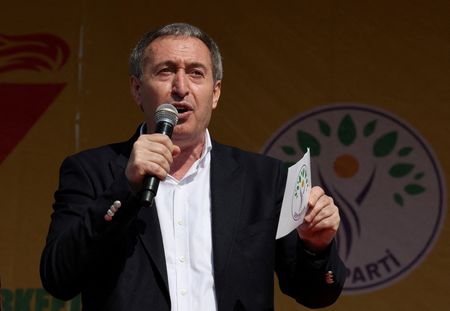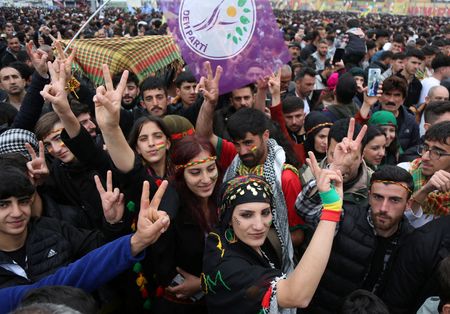ISTANBUL (Reuters) -Turkish authorities on Tuesday prevented the newly elected mayor of a pro-Kurdish party taking up his post and announced a re-run vote in another district where President Tayyip Erdogan’s party lost, prompting legal challenges and opposition condemnation.
A document seen by Reuters from the election board in the eastern city of Van showed that the candidate who came second in that district, from Erdogan’s AK Party (AKP), would instead be handed the mandate to be mayor.
The pro-Kurdish DEM Party urged authorities to lift the ban on its winning candidate, Abdullah Zeydan, and said it would also challenge other results over what it called “illegal voters” that prevented it winning.
The challenges by DEM – parliament’s third largest party, which performed well in the mainly Kurdish southeast – mark the biggest dispute over the results of Sunday’s nationwide local vote in which Erdogan’s AKP was trounced.
Zeydan, the DEM candidate in Van, won 55.5% of votes versus 27.2% for the AKP candidate.
However, DEM said the justice ministry had sent a letter five minutes before offices closed on Friday last week, two days before the vote, objecting to Zeydan’s candidacy, and a court had then ruled that he did not have the right to stand.
Hundreds of people gathered late on Tuesday to protest the decision in several southeastern cities and Istanbul, where protesters chanted: “There is a coup in Van.”
The ministry referred questions on the issue to the Supreme Election Board (YSK), which referred the issue to the election board office in Van, where nobody could be immediately contacted for comment.
“This wrong decision must be reversed immediately,” DEM said in a statement.
Party co-chair Tulay Hatimogullari told reporters the DEM would file an objection to the election board on Wednesday.
AKP spokesperson Omer Celik said such challenges were judicial matters and the government could not intervene.
The leader of Turkey’s main opposition party CHP said handing the mayoralty to the second-place finisher “would mean disregarding the will of the people of Van”.
Turkey has cracked down on the pro-Kurdish political movement since the 2015 collapse of a peace process to end a decades-old insurgency, accusing it of ties to Kurdish militants.
The movement denies the accusations but it has been ravaged by thousands of arrests and its mayors were ousted and replaced by state officials after previous elections. Last year DEM was formed to succeed a party facing potential closure in a trial over such alleged links.
CHALLENGES
Separately in the southeast, a local election board annulled the election of a DEM mayor in a district of Sanliurfa after an AKP objection, local media said. The DEM candidate had won with 33.2% support versus 30.72% for AKP, the initial tally showed.
The board cited irregularities in some ballots and set a rerun vote on June 2, according to local media.
In another incident, DEM co-chair Tuncer Bakirhan said on X that 6,541 “illegal voters” had been used to prevent the party winning the vote in Sirnak province. He did not specify what he meant by illegal voters.
He alluded to a video widely shared on social media in which a man in a Kurdish headscarf approaches several young men heading to vote and demanding to know where they are from.
The AKP candidate won in Sirnak with 47.6%, or 18,033 votes, ahead of the DEM candidate on 41%, or 15,553 votes.
The justice ministry also referred a query about DEM’s Sirnak claims to local election authorities, who were not immediately available. In general, election authorities make no public comment about such allegations.
Bakirhan also said DEM launched legal challenges to election results in the eastern provinces of Bitlis and Kars where he also claimed illegal voters were identified. DEM finished second in both provinces.
The government frequently accuses the pro-Kurdish party of links to the Kurdistan Workers Party (PKK) militant group, which launched an insurgency in 1984 in which more than 40,000 people have been killed. Turkey, the United States and the European Union designate the PKK as a terrorist group.
(Additional reporting by Ece Toksabay, Huseyin Hayatsever and Daren Butler; editing by Jonathan Spicer, Mark Heinrich and Gareth Jones)












